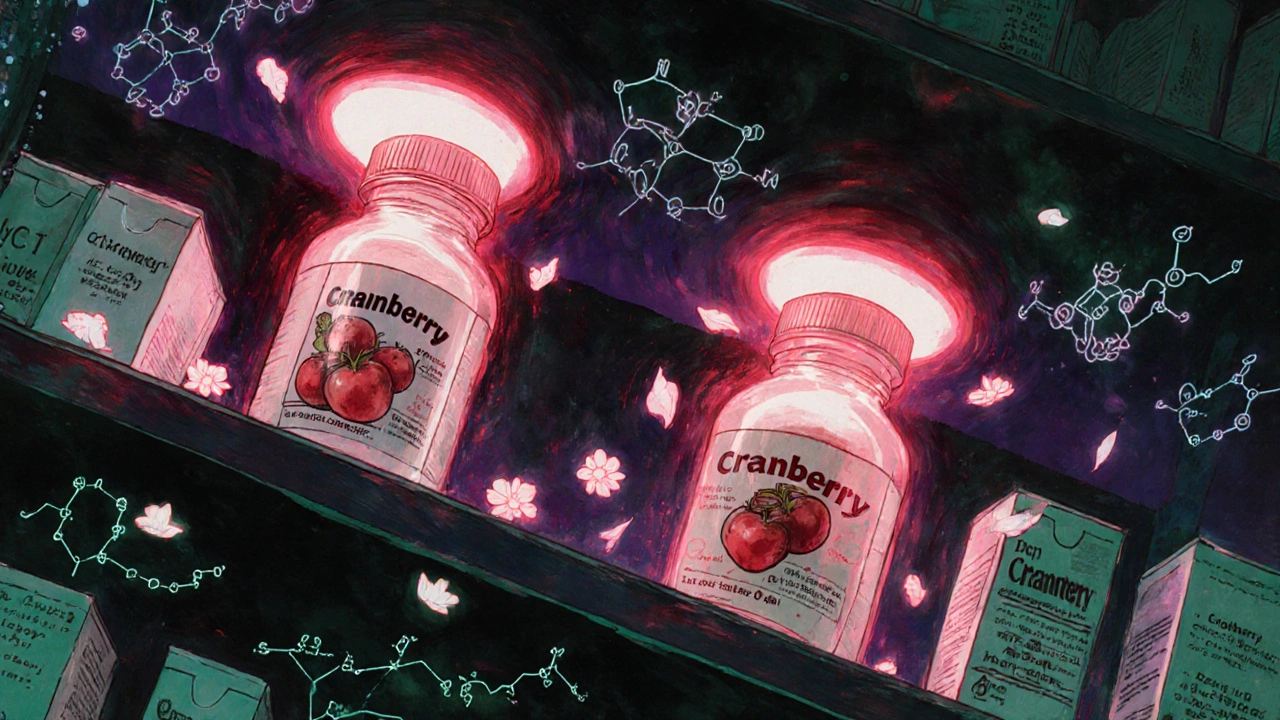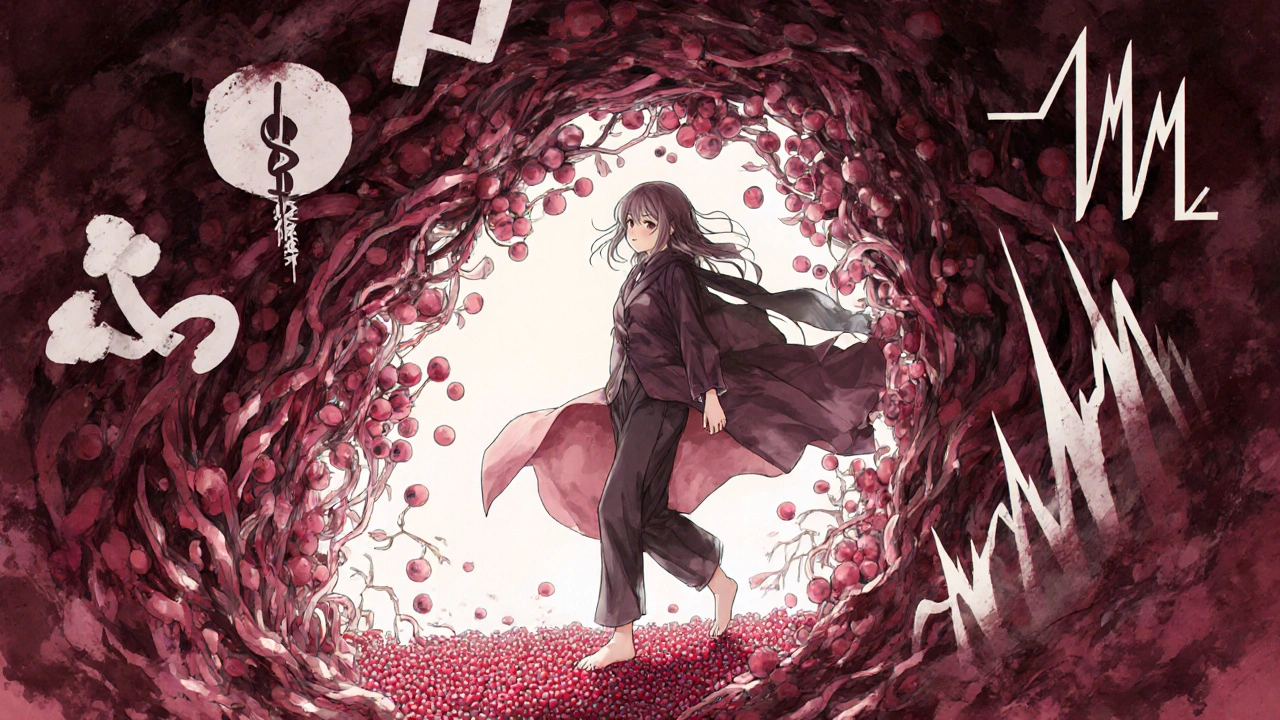Cranberry Juice Medication Interaction Checker
Check Your Medication Safety
Use this tool to see if cranberry products interact with your medications based on current medical evidence.
For decades, cranberry juice has been the go-to remedy for preventing urinary tract infections (UTIs). Women across the U.S. swear by it-chugging it after a long flight, during cold season, or when they feel that first twinge. But if you’re on medication, especially blood thinners like warfarin, you’ve probably heard a warning: cranberry juice might be dangerous. So what’s real? And what’s just fear passed down from one person to another?
Why the Confusion Exists
The panic started in 2003, when a single case report suggested that a man on warfarin had a dangerous spike in his INR (a measure of blood clotting) after drinking cranberry juice daily. That one story sparked headlines, pharmacy warnings, and years of debate. But science doesn’t run on single cases. It runs on repeated, controlled studies. Since then, researchers have tested cranberry juice with warfarin in dozens of clinical trials. Some showed small changes in INR. Most showed none. A 2010 review of 15 studies found that while eight case reports claimed a link, the four well-designed clinical trials found no significant effect. In one study, 12 healthy volunteers drank 250ml of cranberry juice three times a day for two weeks-no change in warfarin levels. Another, with 18 women taking amoxicillin, found no meaningful impact on how the antibiotic worked in their bodies. So why do pharmacists still tell patients to avoid it? Because the risk, even if rare, could be deadly. A spike in INR can lead to internal bleeding. And when it comes to medications with narrow safety margins, even a tiny chance matters.Warfarin: The Only Real Concern
Of all medications, warfarin is the only one with a plausible, though still debated, interaction with cranberry juice. Why? Because both are processed by the same liver enzyme-CYP2C9. Cranberry juice contains compounds that can inhibit this enzyme in test tubes. In theory, that means warfarin could build up in your blood. But theory doesn’t equal reality. Most studies using real people drinking normal amounts of cranberry juice (8-12 oz of store-bought cocktail) show no effect. The problem? Concentrated cranberry supplements. These aren’t juice. They’re pills or powders with up to 36mg of proanthocyanidins per serving-far more than what’s in a glass of juice. These extracts are what might actually interfere with warfarin. The American College of Clinical Pharmacy says: if you’re on warfarin, avoid cranberry supplements. Stick to one 8oz glass of regular cranberry juice per day, if you want. And if you start drinking it regularly, tell your doctor. Get your INR checked more often for a few weeks. Consistency matters more than avoidance.What About Antibiotics, Statins, or Blood Pressure Meds?
Here’s the good news: for most common medications, cranberry juice is fine. No evidence of interaction. Not for antibiotics like amoxicillin or cefaclor. Not for statins like atorvastatin. Not for blood pressure pills like lisinopril or metoprolol. Not for antidepressants like sertraline. Back in 2009, researchers gave women amoxicillin with and without cranberry juice. The juice caused a tiny delay in absorption-but the total amount of antibiotic in the bloodstream stayed the same. That’s what matters. Your body still gets the full dose. Same with cefaclor. No clinical impact. Even though cranberry juice can block certain liver enzymes in a petri dish, your body doesn’t absorb enough of those compounds from juice to make a difference. Grapefruit juice? That’s a different story. It blocks enzymes so powerfully it can double or triple drug levels. Cranberry? Not even close.
Supplements Are the Real Wild Card
You’re not just drinking juice anymore. The cranberry supplement market is worth over $1.2 billion. Most of it is pills, powders, or concentrated liquids labeled as “pure cranberry extract.” These aren’t regulated like drugs. No FDA approval needed. No standardization. One bottle might have 10mg of proanthocyanidins. Another might have 50mg. That’s the problem. The studies that found no interaction used standard juice-about 27% cranberry content. The ones that raised red flags? They used extracts with 36mg or more per dose. If you’re popping a daily supplement for UTI prevention, you’re not just having a glass of juice. You’re taking a concentrated bioactive compound. That’s where risk creeps in. The European Medicines Agency requires warning labels on cranberry supplements. The U.S. FDA doesn’t. That’s why you’ll see conflicting advice. Your pharmacist says avoid. Your friend says it’s fine. Your Amazon review says it saved her from three UTIs. Who do you trust?What Should You Do?
Here’s the practical, no-nonsense advice:- If you’re on warfarin: Skip cranberry supplements. One 8oz glass of regular juice per day is probably okay-but tell your doctor. Get your INR checked more often when you start or stop.
- If you’re on any other medication: Cranberry juice is safe. No need to avoid it. You don’t need to space it out from your pills. No evidence supports that.
- If you take cranberry supplements: Check the label. Look for proanthocyanidin content. If it’s over 36mg per serving, talk to your pharmacist. Consider switching to juice instead.
- If you’re not on any medication: Enjoy it. Cranberry juice is a safe, effective way to help prevent UTIs-especially for women who get them often.

Why This Matters More Than You Think
Over 20% of women experience recurrent UTIs. For many, cranberry juice is the only thing that helps. If fear stops them from using it, they end up with more infections, more antibiotics, and more risk of antibiotic resistance. Meanwhile, the fear of cranberry juice is causing unnecessary anxiety. A 2022 survey found that 43% of people who buy cranberry products are confused by conflicting advice. Pharmacists report patients asking about it weekly-even when they’re not on warfarin. The truth? For most people, cranberry juice is harmless. It’s not grapefruit. It’s not pomegranate. It’s not St. John’s wort. It’s just a tart drink with some antioxidants and compounds that may help bacteria stick less to your bladder wall.What’s Next?
New research is underway. A 2023 clinical trial is testing cranberry extracts with newer blood thinners like apixaban and rivaroxaban-drugs that have replaced warfarin for most patients. So far, no red flags. But results aren’t in yet. Industry groups are pushing for clearer labeling. The Council for Responsible Nutrition is drafting voluntary standards that would require supplements with high proanthocyanidin levels to carry interaction warnings. That’s a step forward. Until then, stick to facts, not fear. Don’t let myths keep you from something that works. And if you’re unsure, talk to your pharmacist. They’re trained to sort through this noise.Bottom line: Cranberry juice isn’t a drug. It’s a food. And for most people, it’s perfectly safe-even helpful. Just don’t mix it with concentrated supplements if you’re on warfarin. Everything else? You’re good.


MOLLY SURNO
October 31, 2025 AT 11:24This was such a clear, thoughtful breakdown. I’ve been avoiding cranberry juice for years because my pharmacist scared me with the warfarin thing, but I never realized how little evidence there actually is for juice itself. Just one glass a day? I can live with that. Thanks for cutting through the noise.
I’m a nurse, and I’ve seen so many patients panic over this. It’s not just about the juice-it’s about how we communicate risk. Sometimes the fear does more harm than the thing we’re afraid of.
Alex Hundert
November 1, 2025 AT 08:48Stop being so polite about this. The system is broken. Pharmacists are still telling people to avoid cranberry juice like it’s poison because they’re too lazy to read the actual studies. They just parrot the 2003 case report like it’s gospel. Meanwhile, people are skipping a proven, natural way to prevent UTIs because of outdated fear-mongering.
It’s not just inconvenient-it’s dangerous. More UTIs mean more antibiotics, more resistance, more hospital visits. This isn’t a minor thing. It’s public health negligence dressed up as caution.
Emily Kidd
November 2, 2025 AT 12:31omg yes!! i’ve been taking cranberry juice since i was 16 and i get utis like clockwork every winter. my dr said it’s fine even though i’m on blood pressure meds. i just dont get why people think juice = pills??
also-why are there cranberry pills that taste like chalk?? who even made that decision?? i’d rather drink the juice even if it’s sour as hell. at least it’s real food lol
Justin Cheah
November 3, 2025 AT 19:10Let’s be real here. This whole cranberry juice thing is a distraction. The real issue is the pharmaceutical industry doesn’t want you using natural remedies because they don’t make money off them. That’s why the FDA doesn’t regulate supplements the same way as drugs. They’re letting companies sell concentrated cranberry extracts with zero oversight because they’re too busy protecting Big Pharma’s bottom line.
And don’t even get me started on the fact that warfarin is a rat poison turned medicine. They’re scared of cranberry because it might interfere with a drug that was literally designed to kill rodents. If you think about it, it’s insane we’re still using this 70-year-old chemical when there are safer alternatives. But nope-pharmacies push warfarin because it’s cheap and profitable. Cranberry juice? Too natural. Too harmless. Too threatening to the status quo.
They want you scared. They want you dependent. They want you buying pills, not juice. Wake up.
And yes, I’ve read every study. I’ve cross-referenced the journals. This isn’t speculation. This is systemic manipulation disguised as medical advice.
caiden gilbert
November 5, 2025 AT 18:55I’ve always thought of cranberry juice as the tart little rebel of the beverage world. It doesn’t beg for attention like orange juice or beg to be sweetened like apple juice. It just shows up, punches you in the mouth with flavor, and quietly does its job.
Turns out it’s also the quiet rebel of pharmacology-no fanfare, no hype, just a little bioactive oomph that’s been misunderstood because someone once wrote a case report in a journal no one read until it went viral.
It’s not grapefruit. It’s not a magic potion. It’s just… cranberry. And sometimes, that’s enough.
phenter mine
November 6, 2025 AT 07:43i didnt even know cranberry juice could interact with meds until i read this. i thought it was just for utis. i take metoprolol and i drink like 2 glasses a day. hope im not gonna keel over lol
but seriously, this is super helpful. i’ll start checking labels on those supplements now. didnt even realize they were different from juice. thanks!!
Aditya Singh
November 7, 2025 AT 17:17While your analysis is superficially plausible, it fails to account for the pharmacokinetic variability inherent in CYP2C9 polymorphisms. The literature you cite relies on population averages, but individual metabolic phenotypes-particularly poor metabolizers-can exhibit clinically significant inhibition even at low-dose cranberry exposure. Moreover, the absence of statistical significance in pooled analyses does not equate to clinical irrelevance when dealing with anticoagulants.
Furthermore, you conflate bioavailability with bioactivity. Proanthocyanidins, while poorly absorbed, can exert local effects on gut microbiota and enterohepatic recirculation, potentially altering drug metabolism indirectly. The EMA’s stance is not arbitrary-it is precautionary, grounded in the principle of non-maleficence in pharmacovigilance.
And let’s not forget that supplements are not homogenous. Variability in extraction methods, solvent residues, and matrix effects can lead to unpredictable interactions. Your assertion that ‘one glass is fine’ is dangerously reductionist.
Katherine Reinarz
November 9, 2025 AT 15:44ok but what if i drink cranberry juice AND take warfarin AND my mom says it’s fine but my aunt died from a bleed and they said it was the juice??
also i saw a tiktok where a girl said she got a uti after stopping cranberry and now she’s crying in the bathroom and i just wanna hug her
and why do all the articles say ‘talk to your doctor’ but no one ever says what to ask??
also my pharmacist just yelled at me for asking about it and now i’m scared to go back
is it safe?? i need to know. i need to know NOW.